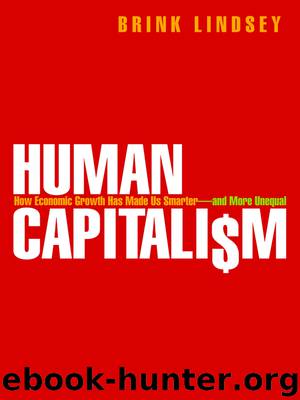Human Capitalism by Lindsey Brink

Author:Lindsey, Brink
Language: eng
Format: epub
Publisher: Princeton University Press
Published: 2013-02-14T16:00:00+00:00
Seven
Reforming Human Capitalism
The emergence of human capitalism is a stupendously beneficial achievement that has brought enormous human progress. The rise of social complexity has catalyzed the development of cognitive capabilities on an unprecedented scale. Educational attainment has soared, and the division of labor has shifted from one deeply dependent on brute manual labor to one ever more heavily reliant on the ever more elaborate honing of talents and skills.
And yet …. At the same time there is a big problem: this progress has been extremely uneven. And these days, alas, this problem is much more salient than all the benefits, as concerns about mass unemployment, stagnating incomes, and widening inequality cast deep shadows on both individuals’ prospects and the nation’s. Over the past generation, the promise of human capitalism has not been realized: although an elite upper third or so continues to take advantage of its proliferating opportunities, for everybody else the connection between increasing complexity and rising skill levels has frayed or even snapped. Educational attainment has stalled, and the lowest-skill jobs are increasing, not decreasing, their share of total employment.
In the previous chapter I explained why I think this is happening. Here’s the bottom line: economic development and cultural development have gotten out of sync with each other. Economic growth is continuing to add to social complexity, and as a result the demand for people with high human capital—that is, people who are fluent with abstraction—keeps going up and up. Yet for most Americans, cultural change has been moving in the opposite direction. Most American kids are now raised in an environment that is arguably less favorable for developing human capital than that in which their parents were raised.
This conflict between economics and culture poses a serious threat to the future vitality of human capitalism. First, of course, there is the threat of squandered potential: the growing demand for more highly skilled workers—which makes possible the growing supply of interesting, challenging jobs—is going unfulfilled. More ominous, there is the threat that widening disparities between the elite and everybody else will prompt a political backlash against the whole system. That backlash could well take the form of policy changes that undermine future economic growth— with a resulting diminution in the possibilities for further social progress. Potential unrealized is bad enough, but potential eliminated altogether is even worse.
To redeem the promise of human capitalism, it is necessary to restore the connection between rising complexity and rising human capital across the socioeconomic spectrum. For that to happen, we need public policies that encourage healthy cultural change. Policies to reshape the environment in which most Americans are born and raised so that it promotes rather than hinders their development of the intellectual, social, and personal skills needed to cope with social complexity. And policies to remove barriers that currently discourage people from making use of the capabilities they already possess and then building on them.
This is a huge and difficult undertaking, to be sure. Culture, by its very nature, is extremely sticky:
Download
This site does not store any files on its server. We only index and link to content provided by other sites. Please contact the content providers to delete copyright contents if any and email us, we'll remove relevant links or contents immediately.
| Administration | Assessment |
| Educational Psychology | Experimental Methods |
| History | Language Experience Approach |
| Philosophy & Social Aspects | Reform & Policy |
| Research |
The Art of Coaching Workbook by Elena Aguilar(51199)
Trainspotting by Irvine Welsh(21668)
Twilight of the Idols With the Antichrist and Ecce Homo by Friedrich Nietzsche(18635)
Fangirl by Rainbow Rowell(9252)
Periodization Training for Sports by Tudor Bompa(8273)
Change Your Questions, Change Your Life by Marilee Adams(7783)
This Is How You Lose Her by Junot Diaz(6887)
Asking the Right Questions: A Guide to Critical Thinking by M. Neil Browne & Stuart M. Keeley(5775)
Grit by Angela Duckworth(5615)
Red Sparrow by Jason Matthews(5475)
Paper Towns by Green John(5191)
Room 212 by Kate Stewart(5123)
Ken Follett - World without end by Ken Follett(4734)
Housekeeping by Marilynne Robinson(4449)
The Sports Rules Book by Human Kinetics(4388)
Papillon (English) by Henri Charrière(4274)
Double Down (Diary of a Wimpy Kid Book 11) by Jeff Kinney(4273)
The Motorcycle Diaries by Ernesto Che Guevara(4102)
Exercise Technique Manual for Resistance Training by National Strength & Conditioning Association(4071)
